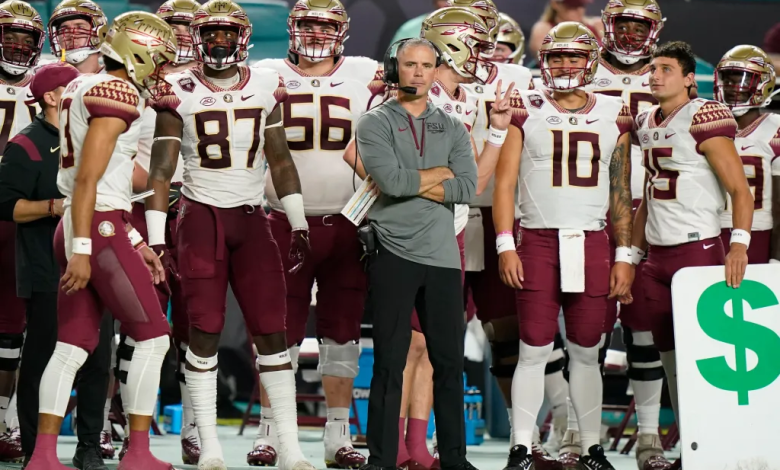Three key lessons from College Football Playoff teams that apply to FSU football

As Florida State University (FSU) continues to reassert itself as one of the top programs in college football, the Seminoles can look to the success of teams that have reached the College Football Playoff (CFP) for valuable insights. The road to national prominence is filled with challenges, but by studying the consistent themes and strategies of the best programs, FSU can improve its odds of achieving its ultimate goal of a CFP berth and, ultimately, a national championship.
The College Football Playoff has become the gold standard of postseason college football, showcasing the elite programs that consistently put together championship-caliber teams. Programs like Alabama, Georgia, Ohio State, and Clemson have set the blueprint for success, each emphasizing different but complementary aspects of football excellence. For FSU, which has been on the rise under head coach Mike Norvell, there are three key lessons from the College Football Playoff teams that can be directly applied to elevate the Seminoles’ program and make them a perennial contender.
1. Consistency at Quarterback Is Critical for Championship Success
When looking at the teams that have made consistent appearances in the CFP, one common denominator is a stable and high-performing quarterback position. Programs like Alabama, Ohio State, and Georgia have experienced sustained success due to their ability to develop and retain elite quarterbacks. For Florida State to make its own deep run into the College Football Playoff, securing a long-term answer at quarterback is paramount.
Lesson from CFP Teams: Elite Quarterback Play is Non-Negotiable
- Alabama has cycled through talented quarterbacks like Tua Tagovailoa and Bryce Young, who were able to command the offense, make big plays, and perform under pressure. These quarterbacks were the faces of championship-caliber teams, guiding Alabama to multiple CFP appearances and national titles.
- Ohio State has similarly developed quarterbacks who have led the team to the CFP, including Justin Fields and C.J. Stroud, both of whom were able to elevate Ohio State’s offensive performance.
- Georgia has become the benchmark for championship-caliber teams in recent years, and while the Bulldogs’ defense and running game are a huge part of their success, quarterback Stetson Bennett’s leadership in 2021 and 2022 was essential in Georgia’s national title run.
For FSU, Jordan Travis has shown glimpses of becoming that stabilizing force at quarterback. His growth under Norvell has been impressive, and Travis’ ability to make plays with his arm and legs gives the Seminoles a legitimate chance at competing for championships. Travis will need to continue to progress and remain consistent, especially as FSU aims to compete against teams with highly talented quarterbacks.
What This Means for FSU:
- Developing Depth and Stability: FSU must continue to develop not just one but multiple quarterbacks capable of performing at the highest level. While Travis will be the centerpiece for 2025, future quarterbacks like Brock Glenn, the 5-star freshman from Tennessee, should be brought along carefully to ensure that FSU has both depth and a long-term solution at the most important position on the field.
- Quarterback Coaching and Support: The Seminoles should place emphasis on developing a strong quarterback pipeline, similar to what Alabama, Ohio State, and Georgia have done. The quarterbacks on the roster need to be supported by an elite offensive system and coaching staff, and Norvell’s expertise in developing offensive talent will be critical in this process.
2. Defensive Dominance and Depth Are Keys to Playoff Success
Another critical lesson that can be learned from College Football Playoff teams is the importance of having a dominant defense, one that can shut down elite offenses and win games in the trenches. In recent years, teams like Georgia, Alabama, and Clemson have been able to neutralize some of the best offenses in the country by relying on suffocating defense and depth across the front seven and in the secondary. This lesson is especially pertinent for FSU, as its defense will need to evolve to match the powerhouses of college football.
Lesson from CFP Teams: Strong, Deep Defense Wins Championships
- Georgia’s defense has been the hallmark of its success, especially in 2021 and 2022 when it had one of the most dominant defenses in recent memory. The Bulldogs’ ability to rush the quarterback with depth and contain explosive offenses with lockdown cornerbacks has been critical to their CFP runs.
- Clemson has consistently fielded top-tier defenses under head coach Dabo Swinney. Their defensive line, including stars like Christian Wilkins and Dexter Lawrence, has been a key ingredient in winning ACC titles and national championships.
- Alabama, under Nick Saban, has also been known for producing elite defensive units that can stop both the run and pass effectively. Whether it’s through disruptive defensive linemen or playmaking linebackers, Alabama’s defense has been a staple of its sustained dominance.
FSU has shown that it can be competitive on defense, but in order to take the next step and truly contend for a CFP berth, the Seminoles must elevate their defensive consistency. While they have some standout players like Jared Verse and Tatum Bethune, building depth across the defensive line and in the secondary is crucial to FSU’s aspirations.
What This Means for FSU:
- Front Seven Depth: To truly compete with the best teams in the nation, FSU’s front seven must become a relentless, multi-dimensional force. Players like Keldric Faulk, who arrives as one of the top defensive line recruits, and others in the pipeline need to become disruptive forces who can change the course of a game.
- Elite Secondary Play: The Seminoles must continue to develop their secondary, which will be key in defending against the explosive passing games of teams like Ohio State and Alabama. Players like Renardo Green and Jarrian Jones need to step up and help FSU become a balanced, well-rounded defense.
Ultimately, for FSU to succeed in the playoff era, its defense must be built on both star power and depth. This requires elite recruiting, player development, and consistent execution throughout the season.
3. Effective Recruiting and Player Development Are Essential for Long-Term Success
A third key lesson from College Football Playoff teams is that elite programs win by consistently recruiting at the highest level and developing talent into NFL-caliber players. It’s no coincidence that the teams that regularly make the CFP — Alabama, Georgia, Ohio State, and Clemson — are perennial recruiting juggernauts that develop their players year in and year out.
Lesson from CFP Teams: Recruiting and Player Development Are the Foundations of Success
- Alabama has been known for its ability to recruit elite talent year after year, which has been the foundation of its success. Nick Saban has built a program where the next wave of talent is always ready to step up and fill the shoes of those who graduate to the NFL.
- Georgia, under Kirby Smart, has made recruiting an art form. His program focuses on not only securing elite talent but developing players into top-tier performers on the field, particularly in the trenches and in the secondary.
- Ohio State’s recruiting efforts are consistently ranked among the best in the nation, and they’ve built a pipeline of talent at every position, from quarterback to wide receiver and across the defensive front.
- Clemson, once an underdog, has transformed into a recruiting powerhouse, largely due to the development of players like Deshaun Watson, Trevor Lawrence, and others who turned into household names.
Norvell has shown that he is capable of both recruiting well and developing talent. Under his watch, FSU has improved in both areas, and this success is vital for the program’s long-term success. However, for the Seminoles to truly reach the elite level, they must continue to recruit at an extremely high level and develop that talent into game-changers.
What This Means for FSU:
- Consistent Recruiting Success: FSU must continue to recruit not just talent, but the right kind of talent that fits Norvell’s vision for the program. This involves prioritizing athletes with high football IQs, elite physical attributes, and a desire to buy into the team-first mentality.
- Player Development Focus: Once recruits arrive on campus, FSU must continue to develop them into the best version of themselves. Strength and conditioning, position-specific coaching, and leadership development are all critical factors in preparing players for both college football and the NFL.
By investing in recruiting and player development, FSU will ensure that it has the depth and talent required to compete with the best of the best in the CFP.









